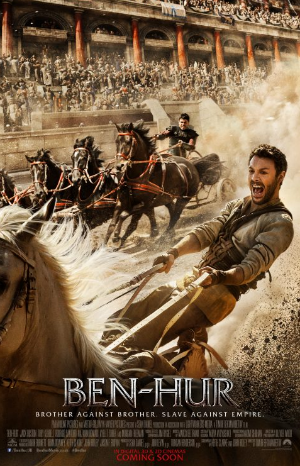'A powerful parable, needed in today’s world more than ever'
The classic story of Ben Hur is set to reach a new generation, with themes of revenge and forgiveness at its heart
 Anger and hatred are often easier than faith and forgiveness. It’s an uncomfortable truth that many of us encounter when somebody wrongs us, or when life takes a turn for the worse. We’ve heard the sermons, we know the theory: but the reality is that our pain-response can take over. It hurts less to protect ourselves with a layer of bitterness.
Anger and hatred are often easier than faith and forgiveness. It’s an uncomfortable truth that many of us encounter when somebody wrongs us, or when life takes a turn for the worse. We’ve heard the sermons, we know the theory: but the reality is that our pain-response can take over. It hurts less to protect ourselves with a layer of bitterness.
Until he discovers the power of redemption, this is the experience of Judah (Jack Huston), the hero of epic new film Ben-Hur, which arrives in UK cinemas on 7 September.
A Jewish prince in First Century Jerusalem, Judah enjoys a privileged lifestyle. His wealthy family have made a few compromises in order to co-exist with the occupying Romans, but Judah’s too young and too self-confident to question this. He’s too busy racing horses with his adopted brother Messala (Toby Kebbell), and pursuing the beautiful Esther (Nazanin Boniadi).
But then, in an instant, he loses everything. Falsely accused of treason by the Roman powers, betrayed by Messala, separated from Esther and from his family, Judah is sold into slavery. During the nightmare that follows he becomes a shadow of his former self, focusing on the one thing he believes can help him survive: the thought of revenge.
By the time he escapes his enslavers and meets Ilderim (Morgan Freeman), a charioteer who might be able to help him get back to his home city, Judah is set on killing Messala. This single-minded mission of destruction puts him at odds with Esther, who has found peace by following a preacher named Jesus (Rodrigo Santoro).
After everything Judah has lost and everything he has been through, why should he forgive? Doesn’t he have the right to pay Messala back for what he did?
Judah’s anger might be justified, but in the end, it won’t save him. Destroying Messala won’t help rebuild the life he’s lost - in fact, it will only drag him back into the painful past. Jesus, a figure who weaves in and out of Judah’s story, offers the possibility of another way: a future built on hope and reconciliation.
This classic story, set to reach a new generation when it comes to cinemas in September, is a powerful parable which is needed in today’s world more than ever. We’re reminded that, even when people have damaged each other seemingly beyond repair, God’s mercy can heal and change hearts.
This article comes from Damaris Media, who create free film resources for community groups.
Baptist Times, 12/08/2016